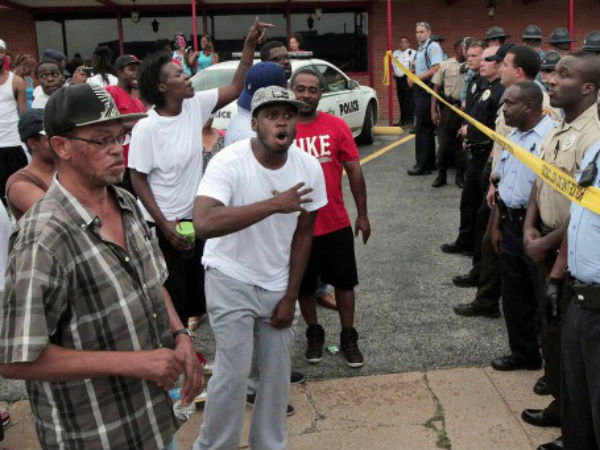Ferguson and the death of Michael Brown: Why should we care?

December 9, 2014
By now, it would be redundant to delve into the intricacies of the shooting of Michael Brown. Those details have appeared on various media outlets for months; they have sparked protests, they have caused widespread debate, and in many ways, they have divided a nation. So if you need to familiarize yourself with what exactly is occurring in Ferguson today, I highly recommend that you head over to your favorite news outlet because there is a plethora of articles, videos, and opinions waiting for you. This is not an article about the shooting. This is an article about injustice.
The issue at hand is not only the death of Michael Brown, because there is much evidence that we are yet to find out. What happened in Ferguson? We do not know. In fact, the only people who do know are the primary witnesses who saw the events unfold before their very eyes. The general public is presented with such limited insight into the shooting because the ‘evidence’ we have is only the evidence that the media chooses to share with us. The majority of what we know was chosen for revelation because it had the “juiciest” details, or would create the best story. In reality, only the grand jury for Wilson’s case has the complete picture, as they experienced the evidence in its entirety – evidence from over one hundred different sources.
Irrespective, there are a few points that we must take away from the undoubtedly tragic loss of a valuable life that occurred on August 9, 2014.
While violent rioting and harm to others certainly have no place in this matter, and are ultimately just detrimental as they can help reinforce the harsh stereotypes that perpetuate such discrimination, they are vents (inappropriate vents, but still vents) of an underlying issue. When you live in a country where the average black middle-class family makes an average of 58% of what the average white middle-class family makes (NPR), when you live in a country where 80% of the people police pull over are black as opposed to 8% white (Time Magazine), and when you live in a country where (as of 2012), 51% of Americans expressed anti-black sentiments in a Yale University poll, there is a deeper issue at hand.
The issue is that, in America, almost one hundred fifty years since the banning of slavery, and around fifty years since the civil rights protests of Dr. King, racism is still an institution. As United States citizens, as followers of Jesus Christ, as students at Cathedral Catholic High School, we have the power to change this. “Change worlds, not the world.” It is our role to change worlds, one person at a time, and show love, tolerance, and acceptance to all, regardless of race.
Ultimately, as global citizens and members of our own species, we eat at the same table, and partake in the one communion that binds us all in our humanity. It is the faith that we share, believer or non-believer, which connects us as children of Christ. That faith, that underlying connection, pervades all races, all language barriers, all cultural differences. It restores us to our most primitive nature, as over any different races, we all belong to the human race.
It is also our duty to care about possible injustices in the world today. As I scroll through my Twitter feed, I notice comments like (and I quote) “Omg, y r we still hearing about Ferguson?” and “He died months ago, black people need to find something else to care about.” How is this acceptable in a twenty-first century, so-called “progressive” society? By caring about the injustices that take place today, we are doing our part in educating ourselves, forming unbiased opinions, and taking action to insure that future racial atrocities do not occur. Speak out, and share ideas and opinions that might help impact change.
It sounds cheesy, and perhaps it is a bit cliché, but the truth remains that we are the future. And as the future leaders of America, as lawyers, as journalists, as doctors, as artists, it is nothing less than our mandated duty to break the chain of ignorance and racism and insure not only a more tolerant, but a more compassionate nation for our posterity. It’s not just ‘tolerance’, as ‘tolerating’ other races and cultures still leaves plenty of room for subtler discrimination, prejudiced mindsets, and continued stereotypes. It is the love that Jesus called us to have. Mark 12:31 says it best: “”The second [greatest commandment] is this, ‘You shall love your neighbor as yourself’…” Jesus called us to love our neighbors as ourselves – regardless of race, of sexuality, of social class, of religion. It is only when we learn to do this that the cycle of ignorance and intolerance will cease.






















































Robert P • Aug 17, 2015 at 9:33 AM
As much as i agree with the non-racist killing of michel brown and mr. wilson was defending himself. That gives that african american community no right to loot and burn building. Heck that would be the reason for the stereo types. (America Racist really, your pull this one! go to iran and see how they treat women)
P.S.: The confederate flag should be torn down after the nazi flag… really cause i think genocide is worse then slavery.
Robert P • Aug 17, 2015 at 9:34 AM
Sorr if i was a tad rude… First time…